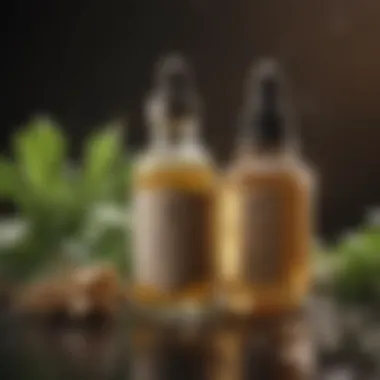Discover the Top Herbs for Radiant Skin: The Ultimate Herbal Skincare List


Well-Being Overview
In the realm of skincare, delving into the world of herbal remedies unveils a treasure trove of benefits for maintaining skin health and radiance. Herbal ingredients like chamomile and ginseng are not mere additives but potent solutions that can redefine skincare routines and offer holistic well-being benefits. As we embark on this journey of herbal skincare, it's essential to understand the profound impact these natural elements can have on our skin's health and vitality. Through harnessing the power of nature, we can achieve a rejuvenated and radiant complexion that goes beyond surface-level beauty.
Herbal Heroes and Their Power
Each herb selected for our ultimate list possesses unique properties that set them apart as skincare superheroes. From the calming effects of chamomile to the invigorating properties of ginseng, every herb has a specific role to play in enhancing skin quality. Dive deep into the magical world of herbs like lavender, rosemary, and aloe vera, as we uncover their secrets to glowing skin. Unveil the hidden potential of these botanical wonders and learn how they can transform your skincare regimen for the better.
Chamomile: The Calming Elixir
Known for its soothing properties, chamomile is a powerhouse herb that calms irritated skin, reduces redness, and promotes a clear complexion. Whether ingested as a tea or applied topically, chamomile's anti-inflammatory and antioxidant characteristics make it a popular choice for sensitive skin types. Discover the serene benefits of chamomile and embrace its healing touch for a tranquil skincare experience.
Spotlight on Ginseng: The Rejuvenating Elixir
Ginseng, the elixir of vitality, brings a rejuvenating touch to the world of herbal skincare. Packed with antioxidants and nourishing elements, ginseng revitalizes tired skin, boosts collagen production, and combats signs of aging. Incorporate ginseng into your skincare routine to unveil a fresher, firmer, and more youthful complexion. Embrace the transformative power of ginseng and witness your skin bloom with radiance.
Mental Health Matters
In our quest for holistic well-being, prioritizing mental health is a non-negotiable aspect of self-care. Understanding the nuances of mental well-being equips us with essential strategies to navigate stress and anxiety, fostering a balanced and harmonious mind-body connection. Let's explore the significance of mental health in the context of skincare and unveil coping mechanisms that promote emotional resilience and inner tranquility.
The Psychology of Skincare: A Mind-Body Connection
Skincare is not just a surface-level aesthetic endeavor but a profound form of self-care that nurtures the mind along with the body. Recognizing the psychological impact of skincare rituals allows us to harness their therapeutic benefits in promoting emotional well-being. Dive into the depths of skincare psychology and uncover how self-care practices influence mental wellness, paving the way for a radiant complexion inside and out.
Embracing Stress-Free Skincare: Holistic Solutions


Stress and anxiety can wreak havoc on both our skin and mental health, disrupting the delicate balance crucial for a glowing complexion. Implementing mindfulness techniques like meditation, deep breathing, and visualization can mitigate the harmful effects of stress on our skin, restoring balance and harmony. Explore effective stress management strategies that seamlessly integrate into your skincare routine, ushering in a new era of calm and clarity.
Physical Wellness
Mindfulness & Self-Care Practices
Nutrition for Nourishment
Introduction
In the realm of skincare, the utilization of herbs has garnered significant attention for their natural properties and immense benefits. Herbal skincare transcends conventional practices by harnessing the power of botanicals in enhancing skin health and vitality. It encompasses a holistic approach to beauty, focusing on nourishing the skin internally and externally with the goodness of nature. Understanding the essence of herbal skincare opens doors to a world where tradition meets modern wellness, offering a plethora of plant-based solutions for various skin concerns. Exploring the synergistic relationship between herbs and skin amplifies the significance of incorporating these botanical gems into daily skincare rituals, paving the way for radiant and healthy skin.
Understanding Herbal Skin Care
Delving deeper into the realm of herbal skincare unveils a treasure trove of botanical wonders that serve as elixirs for the skin. Each herb possesses unique qualities that cater to specific skin needs, ranging from calming and soothing properties to potent antioxidants and anti-inflammatory agents. The fundamental principle of herbal skincare revolves around harnessing nature's potent remedies to rejuvenate, heal, and protect the skin from external aggressors. Understanding the mechanisms by which herbs influence skin health provides invaluable insights into crafting personalized skincare regimens tailored to individual needs. Embracing herbal skincare involves a symbiotic relationship between nature and skin, where traditional wisdom meets scientific validation to deliver optimal results. Nurturing the skin with botanical extracts signifies a shift towards cleaner, sustainable beauty practices that prioritize both skin health and environmental well-being.
Top Herbs for Skin Care
The section on top herbs for skin care dwells into the essence of utilizing natural botanicals to enhance skincare routines. Embracing herbal remedies can offer a plethora of benefits for the skin, catering to various skin types and concerns. Each herb possesses unique properties that can rejuvenate and maintain healthy skin. Through a holistic approach, incorporating herbs like aloe vera, calendula, lavender, tea tree, chamomile, ginsng process, lavender is known for its calming and soothing properties. Its anti-inflammatory and antibacterial characteristics make it beneficial for reducing skin irritations and promoting relaxation. Lavender essential oil is often used in aromatherapy and skincare products for its versatile benefits.
4. Tea Tree
Tea tree is a powerful antiseptic and anti-inflammatory herb renowned for its acne-fighting properties. It helps combat blemishes, reduce redness and inflammation, and regulate oil production. Tea tree oil is a common ingredient in skincare products, particularly those targeted towards acne-prone skin. Its natural antibacterial properties make it an effective treatment for various skin conditions.
5. Chamomile


Chamomile is a gentle herb ideal for sensitive skin due to its anti-inflammatory and antioxidant properties. It helps soothe skin irritations, reduce redness, and promote overall skin health. Chamomile tea and extracts are often used in skincare formulations for their calming effects. This herb is suitable for all skin types, making it a versatile ingredient in many skincare products.
6. Ginseng
Ginseng is a revitalizing herb known for its anti-aging and skin-rejuvenating properties. Rich in antioxidants, ginseng helps increase collagen production, improve skin elasticity, and boost skin regeneration. It aids in reducing the appearance of wrinkles and fine lines, promoting firmer and youthful-looking skin. Ginseng extract is a popular ingredient in anti-aging skincare products.
7. Turmeric
Turmeric is a potent herb with anti-inflammatory and antioxidant properties that benefit the skin in various ways. It helps reduce redness and soothe irritations, making it ideal for acne-prone and sensitive skin. Turmeric also brightens the skin, evens out skin tone, and can help diminish dark spots and hyperpigmentation. Its antibacterial properties make it effective against acne-causing bacteria.
8. Rosemary
Rosemary is an herb rich in antioxidants and nutrients that promote skin health and radiance. It has astringent properties that help tighten pores, regulate oil production, and improve overall skin tone. Rosemary extract is commonly used in skincare products for its rejuvenating and clarifying effects. It aids in combating free radical damage and preserving skin youthfulness.
9. Witch Hazel
Witch hazel is a natural astringent herb that effectively tones and balances the skin. It helps tighten pores, reduce inflammation, and soothe skin irritations. Witch hazel is commonly used as a gentle toner for all skin types, including sensitive skin. Its anti-inflammatory properties make it beneficial for conditions like acne, eczema, and psoriasis.
10. Neem
Neem is a powerful herb with antibacterial, antifungal, and anti-inflammatory properties that make it beneficial for various skin issues. It helps cleanse the skin, combat acne-causing bacteria, and reduce inflammation. Neem oil and extracts are used in skincare products to address acne, eczema, psoriasis, and other skin conditions. Its deep cleansing and purifying effects contribute to clearer and healthier skin.
How to Incorporate Herbs into Your Skincare Routine
Skincare routines have evolved beyond conventional products, embracing the holistic benefits of herbal remedies. Understanding how to incorporate herbs into your skincare routine can revolutionize your beauty regimen. By infusing natural botanicals like Aloe Vera, Lavender, and Turmeric into your daily routine, you can harness their potent properties for radiant skin. These herbs offer diverse benefits such as soothing irritations, reducing inflammation, and promoting skin rejuvenation. Incorporating herbs is not just a trend but a conscious choice towards embracing nature's goodness for your skin.


Choosing the Right Herb for Your Skin Type
Oily Skin:
For individuals with oily skin, the struggle with excess sebum production can lead to acne and clogged pores. However, certain herbs like Tea Tree and Witch Hazel possess astringent properties that can regulate sebum production and effectively cleanse oily skin. Their natural antibacterial characteristics make them suitable choices to combat blemishes and maintain a clear complexion. Despite challenges like potential dryness, the non-comedogenic nature of these herbs makes them ideal for oily skin types seeking balance and clarity.
Dry Skin:
Dry skin often lacks hydration and tends to feel tight and flaky. Herbs like Calendula and Chamomile offer intense moisturization and soothing effects, perfect for nourishing dry skin. Their gentle, anti-inflammatory properties help alleviate redness and irritation, restoring a supple texture to parched skin. While rich in emollients, these herbs may require additional hydration to lock in moisture and prevent further dryness, offering a luxurious solution for dry skin concerns.
Sensitive Skin:
Individuals with sensitive skin experience heightened reactivity to environmental elements, requiring gentle yet effective skincare strategies. Herbs like Lavender and Rosemary, known for their calming and balancing effects, are well-suited for sensitive skin types. Their mild, hypoallergenic nature ensures minimal irritation, making them gentle allies in soothing sensitivities and maintaining skin integrity. While avoiding potential triggers is crucial, incorporating these herbs can provide a nurturing experience for sensitive skin that prioritizes harmony and protection.
Combination Skin:
Balancing both oily and dry areas, combination skin demands versatile solutions that cater to varying needs. Ginseng and Neem, with their adaptogenic properties, possess the ability to regulate oil production in the T-zone while providing hydration to drier regions. These herbs offer a harmonious approach to address multiple concerns, promoting equilibrium without causing imbalance. Despite the dual nature of combination skin, the versatility of these herbs allows for a customized skincare routine that effectively targets different areas, ensuring comprehensive care for a diverse skin type.
DIY Herbal Skincare Recipes
Curating DIY herbal skincare recipes enables you to tailor formulations to your skin's specific needs. From creating customized facial serums with potent herbal extracts to preparing nourishing masks using fresh ingredients, the possibilities are endless. Experimenting with herb-infused oils, floral waters, and herbal teas can elevate your skincare routine, providing personalized solutions that reflect your skin goals and preferences. By incorporating DIY herbal skincare recipes, you can actively participate in the formulation process, embracing a hands-on approach to holistic skincare that prioritizes purity and individuality.
Tips for Maximizing the Benefits of Herbal Skincare
To optimize the efficacy of herbal skincare, consider integrating these tips into your routine. Firstly, perform a patch test before extensive use to ensure compatibility and prevent adverse reactions. Secondly, store herbal products in a cool, dark place to maintain their potency and extend shelf life. Thirdly, experiment with combinations of herbs to enhance their synergistic effects and unlock their full potential. Lastly, monitor your skin's response to different herbs and adjust your regimen accordingly to tailor it to your evolving skincare needs. By prioritizing consistency and mindfulness in your herbal skincare approach, you can maximize the benefits of natural botanicals and elevate your skin's health and vitality.
Conclusion
In the realm of skincare, the significance of embracing herbal remedies cannot be overstated. Throughout this exhaustive journey into the world of herbal skin care, we have unravelled a plethora of herbs that hold the key to unlocking radiant and healthy skin. Each herb, from the calming chamomile to the invigorating ginseng, boasts a unique set of properties that can transform your skincare routine into a luxurious and effective self-care ritual. By integrating these herbs into your daily regimen, you not only optimize the health of your skin but also nurture a deeper connection with nature's bountiful offerings.
Embracing the Power of Herbal Skincare
Delving into the realm of herbal skincare unveils a realm of possibilities that extend far beyond mere beauty concerns. The art of utilizing herbs in skincare routines is more than a trend; it's a holistic approach that honors the healing properties of nature. Embracing herbal skincare means acknowledging the rich history and tradition behind these botanical wonders, each carrying a legacy of nurturing and replenishing the skin. From concocting DIY potions to curating bespoke herbal blends suited to your skin's unique needs, the power of herbal skincare empowers you to take charge of your skin's well-being. Through this embrace, you not only cater to the exterior of your skin but also foster a deeper resonance with the natural world, elevating your self-care routine to a sacred and transformative practice.



